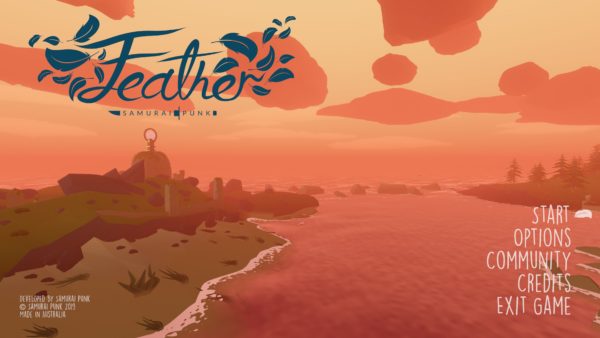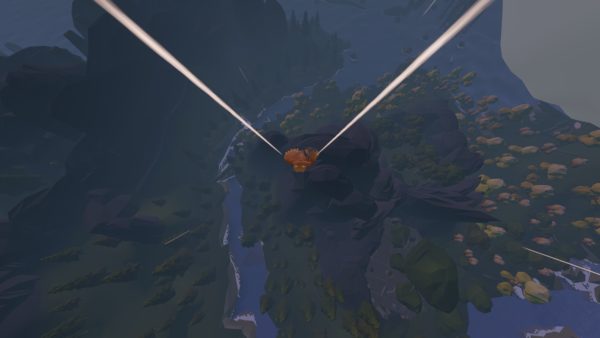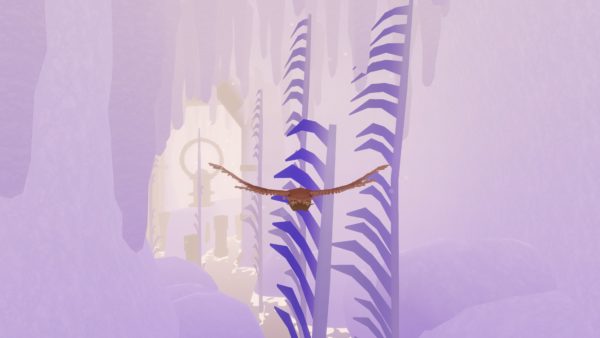The biggest problem with having a game you really enjoy is that it sucks up all the oxygen for other titles. For me currently that’s The Division 2, a game that I will definitely review in the near future, but between it, our new baby and work I’ve had little time to look at many of the other top tier titles that have been released of late. So once again I turn to the indie scene, looking for more casual experiences that don’t ask much of my time but hopefully provide a good experience nonetheless. Feather, from Melbourne based developers Samurai Punk, fit the bill perfectly with its simple visuals, great music tracks and stress free mechanics.

The premise of the game is simple: you’re a bird and there’s a big island you can explore. As you fly around it you’ll find different things you can interact with, most notably the large circular totems that, when flown through, change the music to a new track for you to fly around to. There are no objectives, no enemies to fight or even an end to the game; it’s just simply a place to explore with a handful of different songs for you to enjoy. When we’ve been inundated with numerous games overflowing with mechanics, many designed to keep us coming back or to spend more money on microtransactions, it’s nice to have something that is as simple as it looks.
The graphics are a very low poly affair with little to no texturing, just plain solid colours. This simplicity is augmented slightly by the implementation of some more complex lighting effects and the inclusion of a full day/night cycle for the island. I played this on my now 3 year old XPS, which happens to rock a Geforce 970M, and initially had some issues with the frame rate not being the greatest. Granted it’s not as powerful as the desktop equivalent I have in my gaming rig but it was a little disappointing to see it struggle with something so simple. It may just be how the default configuration was set up as it does have a very high DPI monitor and running the game again on my home rig showed no issues.

The flight mechanics of Feather are pretty great; simple enough to be approachable yet there’s a few subtle things thrown in that you’ll need to master if you really want to explore the island fully. Climbing high and diving down will allow you to approach speeds that you won’t be able to normally and using space bar to hover is a necessity if you want to explore the underground cave system. Unfortunately other players (who will drop in you session from time to time, ala Journey) don’t seem to be as masterful of the controls and so interaction with them can be a little hard. I often found myself and another player going in circles trying to look at each other.
You’re probably not going to spend too long in Feather as even exploring at a leisurely pace would see you get around the island in under an hour or so. That’s likely to make the $15 asking price a little high for some, especially with no plans for the game to grow beyond currently what it is today. This is certainly one of those titles that could benefit from integration with the Steam Community Workshop as there’s already a solid fanbase who love the game for what it is. I don’t usually gripe about price and playtime but it’s sure to be a key deciding factor for many.

Feather is a fantastic, if a little short, experience. The simple premise and it’s solid execution make it a great distraction, something to play if you’ve got a bit of time to spare and don’t want something that asks much of you. However its greatest attributes may be the thing that drives some players away, not wanting to spend their money here when there are many other greener pastures to farm. Still I enjoyed my time with Feather and hope that the concept helps Samurai Punk delve further into developing titles like these.
Rating: 8.5/10
Feather is available on the PC and Nintendo Switch right now for $14.50. Game was played on the PC with 27 minutes total play time and 100% of the achievements unlocked.



